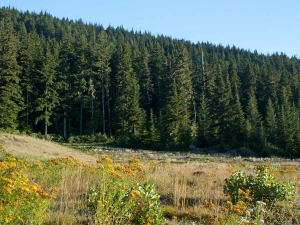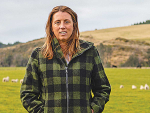Carbon farming is threatening the economy of the central North Island, according to Federated Farmers Whanganui president Ben Fraser.
He warns that whole communities are at risk unless it is stopped.
Fraser says farming plays a huge role in the economy of the region but, increasingly, productive sheep farming is being turned in permanent pine trees.
He wants the Government to urgently close loopholes and strengthen rules to stop carbon forestry conversions on productive sheep country.
He says farming is a big income earner for the region, generating jobs right across the community, but points out that increasingly sheep are being displaced on productive land by permanent pine trees. He says this is a huge concern for those who live rurally, but it's equally concerning for those who live in town.
"At the end of the day, we're all one community, supporting the same local economy. Lock-up-and-leave pine forests just aren't going to generate the same level of economic activity. They may create carbon credits, but they don't create jobs. We at Feds are highly critical of the Government's proposed carbon forestry rules, and we say they don't go anywhere near far enough to be effective," he says.
Fraser says the Government's proposal is to cap the amount of farmland that can be registered in the Emissions Trading Scheme (ETS) at 25%. But he says that limit applies only to land use capability (LUC) classes 1 to 5 - the land least likely to be targeted for carbon farming in the first place.
Read More:
"Only 12% of recent whole-farm conversions to carbon forestry have actually happened on land classes 1 to 5 anyway, so it's not really a solution at all. The remaining 88% have happened on land classes 6 and 7, which also happens to be the land where most of our sheep and beef farms operate," he says.
Fraser says LUC is a tool designed for determining the land's capability and it's been used to set rules and limits, but points out that capability is often confused with productivity. He says it's productive sheepbreeding country that's critical in NZ's farming and food production system.
"If productive sheep and beef farms continue to be replaced by permanent pine forests, soon we'll be bartering pinecones for a new pair of boots," he says.
Fraser says that class 6 and 7 land is far from barren or marginal, rather it's the picturesque hill country that features on postcards, calendars and TV shows such as Country Calendar which celebrate NZ farming life.
"This is the landscape many Kiwis are most proud of - the classic sheep and beef hill country that defines out rural identity," he says.
According to Fraser, the impacts of carboin forestry on the Central North Island can already be clearly seen in places like Taumaranui, where local communities, rural schools and businesses have been decimated.
"I would hate to see the same thing happen to Taihape or Whanganui. Once that land's planted in pine trees for carbon forestry, it's gone for good and never coming back. Is that really the future we want for our country?"



















